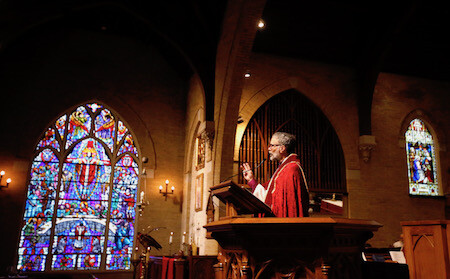How to Hear a Sermon Part 1

I think most clergy of the Diocese of Dallas are good preachers... I think, because I never actually hear them when I pray Sunday by Sunday. I know from my own experience as a preacher that I have Sundays when the sermon hits the mark, and others that don't, some doubles to left center, and other weak grounders too short! I have also learned over almost 40 years that the ones I like and the ones that speak to people are different, and that what speaks cannot be predicted. Once I speak them I have to let go of them. But congregations have a right every Sunday to expect that I, and your pastor, have prepared. But just as preaching is a calling and a task, so is hearing a sermon. The congregant must be an active listener who seeks to take hold of what I am struggling to say and apply it to his or her life. What other kinds of assumptions support this spiritual task of hearing a sermon? When I was in college my teacher of New Testament, Dean Krister Stendahl of Harvard Divinity has his 10 Commandments of Preaching, whose entries Never preach on love – because you will be misunderstood and You are responsible for what was heard not what you meant could be blogs of their own. Let me try to put forth 10 of my own guidelines, assumptions that conduce to profitable listening.
- Every sermon must be 51 percent good news - bishop Paul Marshall. The important thing in this aphorism is what is meant by good news. That makes the rule more than a preference for cheeriness, which is surely unfounded in our world. Gospel declares a fact about history and the world, namely that what Jesus Christ has done has changed things. Now a sermon may describe in a thousand ways how that deed changes how you should think about politics, ethics, emotions, social relations, etc. But it is not primarily opining on these things.
- Sermons should help us hear what God is saying to us, hear and now, through a passage of scripture. Taking this seriously is quite radical, and should offend our secular mind. God can and does speak to us, and that is why the Bible is called the Word of God. Now explaining the context and details of the ancient world, etc. may help us hear this address, but is only meant to subserve it.
- 1 and 2 are fortunate, since none of our lives are interesting enough to sustain a congregation's attention more than a couple of months! Now this is tricky since the preacher must recall that he or she is one more hearer too, in the same boat as the congregation when it comes to life and death. So in some way we address sermons to ourselves, the congregation overhearing - in this way we are assured that they matter to us. But they cannot be self-involved, narcissistic or publicly therapeutic.
- The medievals were right: all sermons, one way or another, have explicatio/ meditatio/ applicatio. Of the making of books with sermon prep methods there is no end. Sermons can be thematic, expository, narrative, participatory, and on and on. It is probably good for the parish priest to change it up. But I reckon they all have these moments: some explanation of what the passage is actually about, some reflection about how this relates to what Jesus on the cross and out of the tomb has changed my circumstance, and how seeing that anew would change how I lead my life. Those three are paraphrases of the Latin words from the Benedictine tradition.
To be continued….
Peace,
GRS



